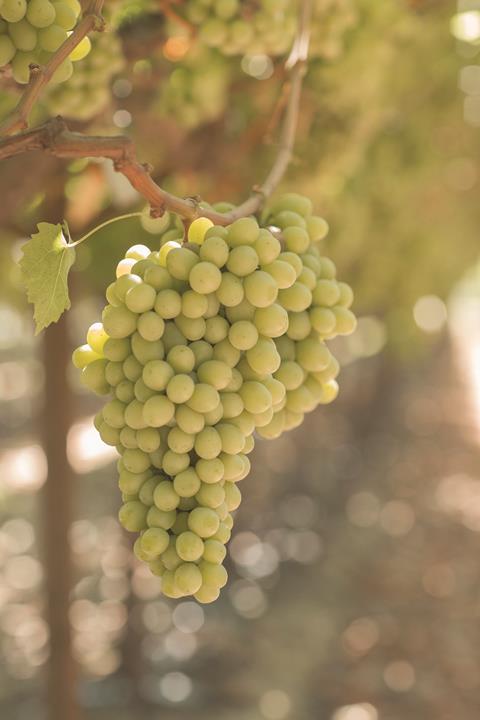China’s efforts to embrace protected varieties has had a transformative effect on the country’s fruit industry

I’m no stranger to seeing insane prices for fruit in China. Throughout the year, we can see local cherries selling for well over US$70 a kilogram, US$100 square watermelons from Japan, US$40 for a single bunch of locally grown Shine Muscat grapes, and many other mind-boggling prices for fruits. Being in the grape industry, the grapes catch my eye.
Shine Muscat grapes were originally bred in the late nineties and released in 2003 in Japan, where they are still prized and protected today. It didn’t take long for the variety’s popularity to soar.
Fast forward to 2006, when Chinese growers began noticing the popularity of this variety and decided to take a crack at growing it locally.
It took the better part of a decade for growers to figure out how to cultivate the variety, but between 2016 and 2022, the planted area for Shine Muscat exploded from around 40,000ha to over 400,000ha.
This rapid expansion, however, was especially unfortunate for the Japanese National Institute of Fruit Tree Science, the original breeders of the variety. Because they did not go through the formalities to receive PVR on the variety in China, they missed out on millions of dollars in royalties.
The sad part of this story is what is now happening to the growers. Because this variety has been planted so widely, the market is starting to suffer under the weight of thousands and thousands of tonnes of mediocre (and often downright bad) fruit.
While many growers still cling to the hope that they will be able to achieve high prices for these grapes, the situation is dire for most.
China’s PVR journey
China’s journey with Plant Variety Rights (PVR) has been nothing short of transformative yet fraught with its own set of challenges.
Over the past two decades, China has seen a surge in protected fruit varieties and PVR applications, reflecting the country’s commitment to agricultural innovation and its strategic role in the global market.
By 1999, China had made its first significant leap by joining the International Convention for the Protection of New Varieties of Plants (UPOV), setting a baseline of standards for legal protection.
This was followed by the introduction of specific laws in 2000 to protect plant variety rights, marking the beginning of what would be a rapid journey toward agricultural innovation.
In 2019 alone, there were over 34,000 PVR applications in China, accounting for a significant portion of global applications.
By 2023, China was not just participating, but leading in global variety registrations.
The growth has been nothing short of explosive – take citrus, for example, where the number of protected varieties increased from 80 in 2012 to 125 in 2023.
International collaboration
One of the most remarkable aspects of China’s PVR journey has been the level of international collaboration involved. Research institutes from around the world—South America, North America, and Europe—are increasingly participating in China’s burgeoning PVR-related business. Private industry giants like Bloom Fresh, Driscoll’s, and Dole have made substantial investments, seeing the potential of China’s growing influence in global agriculture.
China’s focus on PVR is not just about protecting intellectual property; it’s about driving economic growth, enhancing food security, and expanding global market access. The robust IP protection framework in China has attracted significant investment from both the private sector and government, fostering innovation and boosting productivity.
Cutting-edge breeding
China’s agricultural innovation isn’t just about quantity; it’s about the quality and type of breeding being done. Of the varieties being bred in China, 65 per cent are developed using traditional breeding practices, 25 per cent through genetic engineering, and 10 per cent using other biotechnologies. This diverse approach to breeding is not only increasing yield but also enhancing the resilience and sustainability of China’s agricultural sector.
For example, IP-protected apple varieties in China have shown a 20 per cent increase in yield compared to traditional varieties, thanks to enhanced traits like disease resistance. These advances are not only making farming more profitable but also more sustainable, as many of these new varieties require less water and fewer pesticides.

The road ahead: challenges and opportunities
While China has made incredible strides in PVR, there’s still a long way to go. Enforcement remains a significant challenge, and the market is still adjusting to the influx of new varieties. However, the progress made so far indicates that China is heading in the right direction. The story of Shine Muscat serves as a powerful reminder of the importance of PVR protection – not just for breeders, but for the entire industry. Without proper protection, even the most promising varieties can become victims of their own success, leading to market saturation and a decline in quality.
Looking ahead, the focus must be on creating a balanced approach that not only drives innovation but also sustains long-term profitability for growers and satisfaction for consumers. With the right safeguards in place, China has the chance to set a global standard for how IP protection can enhance the entire industry.
In the end, the point of PVR protection is to make the industry more valuable. This means that growers need to be more profitable, and consumers must have a better consumption experience. Shine Muscat’s story is a lesson not just for China, but for the world.
David Smith is general manager of Bloom Fresh China. This article is based on a presentation David delivered at Asia Fruit Logistica’s China Business Meet Upon 27-28 May.



